|
That accomplished English traveler, the
Hon. Mr. Murray, is reported to have said,
upon the interesting occasion of his first visit
to the scenes of our present jaunt, To my
shame he it spoken, I have never looked upon
the Juniata until to-day. Many others, no
doubt, have thus reproached themselves for
leaving the fairy beauties of this charming re-
gion to blush so long unseen.
To ourself, the very name of the Juniata
one of those sweet and apposite Indian words
of which the barbarous taste of the age has left
so few always came with whispers of poetry
and romance, to he enjoyed in some remote
good time coming. In our childish igno-
rance we dreamed of the Juniata as a mythic-
al world, or at best as some far-off Mecca, more
inaccessible than storied Alp or Apennine; nev-
er imagining that all the dainty
charms with
JUNCTION OF THE JUNIATA AND THE SUSQUEHANNA.
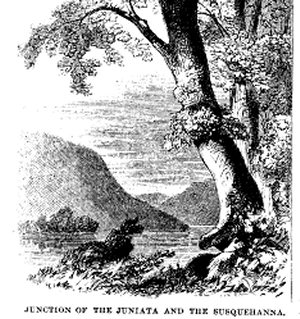
Entered according to Act of Congress, in the year 1850, by 1-Jarper and
Brothers, in the Clerks Office of the
District Court for the Southern District of New York.
VOL. XU.No. 70.E E
View
page 434
434 HARPERS NEW MONTHLY MAGAZINE
which our fancy invested it (and fancy, as we
have since learned, did not tell us one half
the truth), laid almost within the range of our~
daily walk; and when we see so many of our
neighbors making long, painful pilgrimages in
quest of pleasures which they here leave unseen
behind them, we can not but think that our an-
cient error is still too wide awake in the land,
and that people need to be reminded at least, if
not informed, that the blue waters which heard,
and the bold crags which echoed, the glad voice
of bright Alfarata,5 may be seen and en-
joyed with very little cost of time, trouble, or
money.
The great State of Pennsylvania is, in its
physical aspect, nearly equally divided from
north to south into three distinctly marked
phases. The central, or mountain region, of
two hundred miles in breadth, with the rich
meadow lands of the Atlantic slope on the one
side, and the fertile basin of the Ohio on the
other. The genial soils and suns of the east-
ern and the western regions furnish forth those
abundant stores for which the State is so fa-
mous, of oats, peas, beans, and barleycorns,
while the mountain ridges yield a great portion
of the mineral wealth of our country, and send
us those vast stores of anthracite, of which every
winter hearth in the land speaks so glowing
ly. It is this central region too, which, while
brightening our homes in winter, warms our
hearts in summer with every variation of nat-
ural beauty. Its extent (of nearly two hundred
miles, as we have said) is occupied by numer-
ous parallel ridges of the great Appalachian
chain of hills, running in a general course from
the northeast to the southwest. Nearest to the
Atlantic division we have the South Mountain;
next beyond, the Blue Ridge and the Kittatinny,
through which the Delaware breaks at the eel-
chrated Water Gap, and the Lehigh at Wind
Gap, and again the noble Susquehanna, not
far from its meeting with the Juniata. These
chains of hills have an average elevation of a
thousand feet or more, not sufficient to make
them of very great pith or moment to the art-
ist, though they hold in their laps countless
gems of water and valley beauty. It is through
the thirty or forty miles of hill and dale which
lie between the Kittatinny and the Susquehan-
na that the great coal-beds which supply so
much of our fuel are found. Next come the
Tuscarora and the Sideling Hills, inconsidera-
ble ridges, extending from the center of the
Juniata to Maryland, while yet beyond rise the
lofty outlines of the Alleghenies, the great west-
ern walls of the mountain region, though the
Ohio basin, which now follows, is still broken at
intervals by lesser elevations, of which the chief
are Laurel Ridge, twenty-five miles distant, and
Chestnut Ridge, ten miles more.
In the very heart of that wild portion of Penn-
sylvania is the unvisited and almost unknown
home of the Juniata, one of the loveliest of the
rivers of America, and, with the neighboring
waters of the Susquehanna, of which it is the
principal affluent, most justly the pride of the
Keystone State. The Juniata, leaping from the
crags and chasms of the Alleghenies, winds its
~UP THE JUNIATA AT NEWPORT
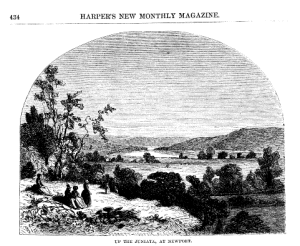
* The once popular son~,:
Wild roved an Indian girl, bright Alfarata,
Where flow the waters of the blue Juniata
View
page 435
THE JUNJATA. 485
lonely and devious way eastward through a hun-
dred and fifty miles of mountain solitude to its
final nuptials with the Susquehanna; and great-
ly is the placid nature of that staid old river-god
vexed by the madcap moods and the turbulent
waters of its roystering young mate, shouting
Presto! chango ! to his ancient bachelor rev-
eries, and leaving him henceforth nothing hut
toil and trouble. Thirty years ago this region
of the Juniata was a great highway, as it is now,
over the mountains to the Ohio, but then the
rude journey of the ponderous wagons wa~
a long and painful matter, while to-day the
route is traversed with all modern ease and
speed of locomotion. The Pennsylvania Rail-
way (next to the Erie Road in New York the
grandest in the Union) follows the river from
its mouth to its source, in immediate compan-
ionship all the way with a canal and telegraph
line. The river is itself unnavigable.
Our aproach to the Juniata was through Phil-
adelphia and Harrisburg, the State capital, to
the junction of the river with the Susquehanna,
where we halted for some pleasant days under
the homely roof of John Miller, whom we cul-
tivated in our hours of is a-door rest, as an agree-
able example of the honest sturdy yeomen and
forest character of the people among whom we
were about to dwell. John Miller scorns
to be misterdis one of those grave, plodding,
one-horse Pennsylvania Dutchmen who origin-
ally settled the region, and have managed to
withstand all the Yankee galvanism which is
daily more and more infecting the slumberous
air they breathe. John Miller had inhaled
enough of the poison to feel a little curiosity
as to the character and errand of his unlooked-
for guest; indeed he plainly asked us at once
what might be our business therea question
which he seemed to think very rationally an-
swered when we told him that our business was
to eat our dinner, which we would attend to in-
dustriously as soon as he should set it before
us. To dine was, in John Millers estimation
the employment of a reasonable man, and a
vigorous appetite did more than any thing else
in helping us to live down much prejudice
which our vagabond and, to his eyes, profitless
wanderings over hill and glade created. We,
however, failed utterly to convince him of the
sanity of our daily strolls at dawn or sun-set-
ting to the tops of the surrounding hills. To
his incomprehension it was all a stumbling-
block, and our very choicest bits of distance
middle-ground, and foreground, only foolish-
ness, for John Millers soul had never been
Touched by the love of art to learn to know-
Natures soft line and colors varied glow.
He did, to be sure, seem to be thinking better
of us when we once gravely listened to his sug-
gestion to paint his red old homestead, or the
condemned canal-boat, moored near by.
From the highlands overtopping John Mil-
lers tavern John had never heard of a hotel
we picked up our frontispiece of the meeting of
the waters. These eminences command charm-
ing prospects on all hands, northward up the
winding course of the broad and placid Susque-
hanna, with its verdant islands and long white
sand-bars dotted with groups of lazy cattle;
and southward over fertile pastures and village-
gemmed lawns, while the glimpses westward,
LOOKING NORTH, AT NEWPORT
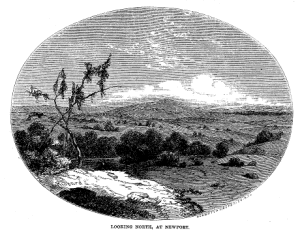
View
page 436
436 HARPERS NEW MONTHLY MAGAZINE.
up the course of the Juniata, make you in haste
to explore its hidden treasures.
Our second and third pictures are from the
hills south of Newport, tea miles onward; and
the next convenient stopping-place after John
Millers. Agreeable bits of middle-lands and
line stretches of mountain distance maybe gath-
ered in this vicinage. The banks of the canal
also afford here charming wooded walks, while
the surrounding creeks are full of pretty glens
and forest nooks. Newport itself is a misera-
ble little hamlet, with few creature comforts to
tempt the bon vivant. In point of fact, we may
as well make a clean breast of it, and confess at
once that the bills of fare are nowhere, in the
whole sweep of the Juniata, very fascinating.
The kitchens and tables are as primitive as the
hills. Not a solitary dinner there comes grate-
fully to our memory; and the cigars are as un-
like the Havanas for which they are sold, as
are the beauitiful creations which embellish the
salons of our connoisseurs like the real cdd mas-
ters whose names they take in vain. This, how-
ever, is, of course, a matter of but trifling con-
sideration to the earnest worshiper of Nature.
Who would not prefer rosy morn to rosy
wine? who would not rather gaze into the crys-
tal current of the pebbly brook, than swallow
the trout which disport therein? who would not
rather watch the flight of the deer over his na-
tive heath than dissect him into steaks? who
would not rather drink in the songs of the bird
than eat him up, wings and second joint ?
who would not ? Don't all speak at once,
sthetic readers!
The elegancies and luxuries of life will doubt-
less increase here in due course of time, and
with the advancing numbers and wealth of the
people; and with this social progress, the pres-
ent lonely physique of much of the landscape
will become softened and embellished by en-
larged industry and improved taste. The con-
veniences and pleasures of polished life can
hardly be expected in a new and wild forest-
land, where the dwellers are absorbed in the
rude labors of mining, manufacturing, and trans-
porting iron and coal.
The Juniata is one of the chief thoroughfares
by which the myriads of European immigrants
reach their new homes in the Western wilder-
ness. The vast amount of travel and carriage
incident to such a highway and to the occupa-
tions of the people, give the region a more busy
and bustling aspect than the extent of the popu-
lation warrants. Long trains of cars pass contin-
ually, and the horns of the boatmen on the canal
keep up an incessant jargon of horrid sounds.
The sudden halting of a line of emigrant cars in
one of the usually quiet towns creates for the
time a magical metamorphosis. Seclusaval sud-
denly becomes Babel. The air so hushed an in-
stant ago, is now rent with the ming~led voices of
the hundreds of strange figures disgorged from
their narrow dens. The Wapping of some pie-
thoric metropolis seems to have bounced down
into the startled forest. A brief space the bell
rings, the whistle of the locomotive shrieks, the
crowds rush back to their lairs, and the demon vis-
ion passes as though it were in truth but a dream.
In the neighborhood of Millerstown, Mifflin
THE JUNIATA AT LEWISTOWN
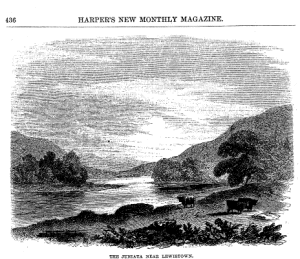
View
page 437
THE JUNIATA. 437
town, and Lewistown growing villages yet far-
ther up the river numerous romantic brooks
and brooklets come dancing down into the val-
leys. In these streams the fisherman may find
abundant and rare sport. The trout here are
still comfortably unsophisticated, having seen
too little of society to lose much of their native
simplicity of character. You may pay your lead-
en compliments also to the astonished deer as
they halt in simple wonder at your novel pres-
ence. In an exploration of one of these minor
waters at Lewistown we passed successively
sundry charming mills and cottages, merry cas-
cades, and much grateful, bowerd walk. The
fourth picture of this series is a view looking
down the river east of Lewistown.
From the old inhabitants of the villages and
wilds in this gnarled latitude, the curious and
genial tourist may gather rich pages of Indian
history and romance, which will give an irresist-
ible charm to the waters, and islands, and rocks
of the merry Juniata, where neither nature nor
art may have done sufficient to win his love;
or rather, perhaps, where his own perceptions
may prove too dull to detect and appreciate
their beauties. It was on one of our many er-
ratic peregrinations among the mountain wilds
of this vicinage that we stumbled upon an unex-
pected, hut not the less welcome dinner, at the
rude homestead of a venerable forester, whose
memories, early associations, and descent, were
picturesquely interwoven with the history of the
ancient occupancy of the soil. His ancestors,
during the stormy days of the early settlers (so
he informed us, as we smoked the calumet to-
gether after our homely meal), suffered as too
many then did one fatal night from a murder-
ous surprise by the jealous and revengeful red
men. All fell beneath the edge of the toma-
hawk excepting two youths, whose good fortune it
was to effect an escape, and a mere child, whom
the victors bore off into captivity. Perhaps it
was her magic beauty, her winsome smile, or
the spell of her gentle nature, that protected her.
Certainly, as after events proved, these talismans
won the stern yet impressionable hearts of her
captors, and bent them in willing obedience to
|
her will. Hearts-Ease, as she was called,
be-
came even more than a queen among her adopt-
ed tribe and race. She exerted an unseen in-
fluence far beyond her confessed authority, ab-
solute even as that was. The counsels of Hearts-
Ease were more than commands they were in-
spirations.
Years fled, and the jealousies and hates be-
tween the Indians and the aggressive white men
matured into open struggle. Two brave and
gallant leaders of the enemy fell at this time, by
the chances of ~ into the hands of the tribe
of Hearts-Ease. Animosity against the pale
face had grown so deep, and the conduct of this
particular encounter had been so deadly on both
sides, that for once even the voice of Hearts-Ease
was powerless to avert the terrible fate to which
her people doomed their captives. The person
and character of the strange little Indian maid-
en, did not, of course, fail to attract the especial
notice of the prisoners. They perceived and ap-
preciated her interest in their fate, and sought
by every means to facilitate the accomplishment
of her generous desires toward them; more,
though, out of a sentiment of gratitude to her
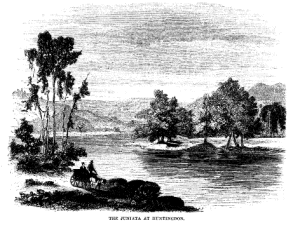
THE JUNIATA AT HUNTINGDON.
View
page 438
438 HARPERS NEW MONTHLY MAGAZINE.
than from any selfish feeling, for they were gal-
lant men, who were ever ready to meet their
fate, and feared not to die. Suffice it to say,
that Hearts-Ease, finding both her authority
and influence in this case unavailing, resolved
to effect secretly that which she might not ac-
complish openly. In this emergency her mem-
ories of her native tongue came happily to her
assistance. By her daring interposition the
prisoners were released on the very eve of the
(lay assigned for their massacre. But even as
they fled their purpose became known, and with
it that of the fair maidens share therein. To
complete their own escape was now easy enough,
hut to leave their preserver to the ungoverned
fury of her savage people was impossible! In
an instant they gathered her in their arms, and
flying unhurt through the terrible shower of ar-
rows which fell like rain about them, they were
soon safe beyond pursuit. The brothers bore
their darling guest far away toward their own
home. As they traveled, and communed, and
looked into each others souls, Hearts-Eases
nature seemed to develop into new and won-
derful phases. The brothers won from her her
little history, as far as many years and strange
events had left the memory of it in her mind.
A vague suspicion, a wild hope, a glad and joy-
ful certainty sprung up and grew in their hearts
as nearing, and at length (after weeks of toilsome
journey) reaching, their native forest-hearth,
they dreamed, prayed, and knew of a surety
that their noble captive, their brave little say-
jour, Heart s-Ease, was none other than their
own long-lost and beloved sister.
When the strong passions of the hour were
calmed, their old love and reverence for their
stolen queen came hack in redoubled force to
the bosoms of her Indian brethren. They sought
her unremittingly, and when at last successfully,
her power over them sufficed not only to obtain
their pardon for herself and her brothers, hut to
secure their perpetual good-will and protection
for her racea treaty which was ever afterward
kindly and sacredly observed.
With such touching narratives did the old
man cheer our way; and so, in the wildernesses
of our vast territory, north, south, cast, and
west, every where have such unwritten romances
beguiled us. Let the historian seize their subtle
and sweet aroma while they yet live in the mem-
ory of men, for in the incidents and emotions
which they created and developed we may hest
read the secrets of that strong and nohie nature
which in after days so indignantly shook off the
hand of oppression when it bore too rudely, and
which has taught the people of to-day to feel
and maintain themselves true and gallant men.
Let the romancer snatch them, for in them is
hidden the very essence of fiction the poetry
of truth.
In the time and space which we have just de-
voted to memories of other days, we had pur-
posed transporting the reader westward from
Lewistown, past many attractive scenes, to the
subject of our fifth picture, near the pleasant vil-
lage of Huntingdon. This scene meets the eye as
you stroll on the river shore, close by your inn; or
as you look hack for an instant while entering the
village, on the railway. As we now approach the
THE JUNIATA AT WATER STREET.
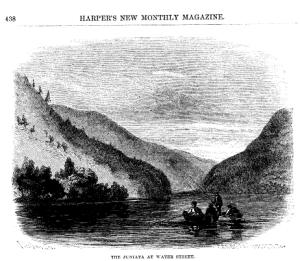
View
page 439
THE JUNIATA. 439
upper waters of the Juniata, the character of the
country grows momentarily more strongly marked.
The hills wear a more imposing front, and en-
croach more and more upon the area of the val-
leys. At Petersburg the railway, which thus far
has very closely hugged the river, flies off for a
while, and flirts with the Little Juniata. By
either route the river and canal or the railway
the voyager will be well amused. On the
main river we pass through the village of Alex-
andria, the social center of a pleasant country,
Our next halt is at a little hamlet called Water
Street. Here the canal merges in the river,
forming what the boatmen style slack water.
The hills at this point are of commanding ele-
vation, and the river road is for a few miles
charmingly sheltered and secluded. The mount-
ain flanks are in many places marked with the
debris of the land slides which give so weird a
look to much of the Juniata scenery; an expres-
sion which led John Miller to remark that the
whole country looked as though it had been
struck by lightning and knocked wrong side up.
From Water Street the river continues on-
ward, though gradually losing its distinctive
character, some twenty or thirty miles to Hol-
lidaysburg, at the base of the Alleghenies. Here
the boats and cars were, at the time of our visit,
transported over the mountains at Blairs Sum-
mit Gap by a portage railroad. This is a con-
struction of great extent and enterprise. It is
forty miles in length, and in its ascent and de-
scent overcomes an aggregate of two thousand five
hundred and seventy feet. There are on the route
ten inclined planes,varying in inclination from 4-~
to 5~ degrees; a tunnel eight hundred and sev-
enty feet long through the Staple Bend Mount-
ain of the Conemaugh; and also four great via-
ductsone of which, over the Horse-shoe Bend,
is a semicircular arch of eighty feet span. The
cost of this road was nearly two millions of dol-
lars. The cars are elevated by stationary steam-
engines at the head of each plane. The neces-
sity for these inclined planes has been since ob-
viated by the substitution of a grand tunnel.
Here we terminate our journey westward;
and, returning to Water Street, take a pleasant
walk of three miles across to the railway at
Spruce Creek. A noble view is disclosed as we
reach the lofty ground overlooking the village
and the waters of the Little Juniata. Far be-
low the rapid cars vanish in the Plutonian month
of the tunnel deep in the mountain side. Spruce
Creek is a new but prosperous town, possessing
the nearest approach to metropolitan appoint-
ment, in the way of a hotel, which the Juniata
region can boast. If we recollect, the table is
provided with napkins, and the office with a
modern patent enunciator. In a house with
acoustic and enunciator privileges, one must,
of course, be happy. We found newspapers,
too, in the reading-room but they were too an-
tique to interest us very much.
We close our chapter with a memento of a
pleasant mornings ramble upon the banks of
the Little Juniata. Carefully folding our nap-
kin at the breakfast-table of the Great Spruce
Creek Hotel, we soon brushed the dew from
the heather and the unaccustomed polish from
our boots, on the grassy banks of the sparkling
little stream. For half a dozen miles we wan-
dered on, over glittering lawns, through dense-
ly-shaded glens, and by rolling cascades, whose
joyous humor blackened the brows of the beet-
ling cliffs and precipices above. We have
rarely found a greater variety of scene within
the same distance than in the course of this
mornings walk on the Little Juniata. The con-
stant and marked alternations of the grave and
gay kept our interest ever alive and alert. The
sterner feature of the landscape here reminded
us continually of the picturesque ravines of the
Catskills. When our walk had extended a few
miles, the secluded character of the way changed
very completely and unexpectedly. From glen
and ravine we suddenly emerged into a culti-
vated valley stretch, full of the shops and shan-
ties of an iron foundry. Here we were agree-
ably surprised to encounter our whilom host,
John Miller. We were not a little astonished
to find him venturing so far from home, and
still more to learn that he had been more than
a week on the journey.
You must, like ourself, have explored the
country on your way, John Miller, said we.
The cars run up from the junction to this re-
gion in a few hours.
Yes, I know they do; hut I came on the
canal. Don't catch me on any of your whizz
and spit railroads! I prefer the good old-fash-
ioned way of traveling on dry land.
We knew before that John Miller belonged
to the solemn race of old fogiesa numerous
class in his section of country and we subse-
quently discovered that this humor colored not
only all his moral and social notions, but even
his religious and political creeds. The masses
in all this latitude, every body knows, appertain
to the go-ahead school of progressive democracy,
except John Miller, as we learned on the occa-
sion of our third and last encounter with him.
We were once again, by the chances of trav-
el, near the junction of the Susquehanna and
Juniata. It was during the heat of the Scott
and Pierce campaign in 1852. While sketch-
ing on the banks of the canal, our attention was
drawn for a moment to the passage of a bat-
teau pulled lustily by a dashing steed, and
crowded by roaring electors, on their way to a
county convention. Flags and banners bear-
ing the names of Pierce and King floated
from all parts of the boat.
Take us down right ! shouted the captain
to us, as he sailed past. Take us down right;
were Pierce and King! Them chaps below is
Scott and Graham ! Turning our head, we)
observed, slowly following, an old lumbering
barge, laboriously pulled by a dozen wearied
fellows, while, lounging at the helm, the only
man on board, was John Miller!
The primitive and rude character which we
have remarked in the physical aspect of much
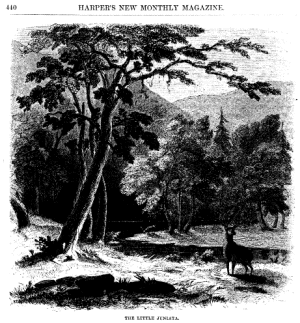
View
page 440
440 HARPERS NEW MONTHLY MAGAZINE.
of the Juniata region, is quite as strongly seen
in the morale of the people. They have among
them too great a leaven of plodding Deutschland
to evince much of that restless progress which
Yankee speed of invention and unrelenting exe-
cution is so brilliantly manifesting in other parts
of the country. They have, no doubt, all the
infallible certainty of Vaterland, and it is clogged
with the equally national characteristic of slow-
ness. There must he fewer John Millers among
them before roses will grow very thickly and
luxuriantly in their wildernesses. The Ger-
manic populations of Pennsylvania are as in-
dolent in their way as are the self-indulgent
Sonthrons; hut the indolence of the former is
widely different from that of the latter, and less
hearable, inasmuch as being with the one the
development of a sluggish nature rather than
of an enervating climate, it is never roused into
corresponding earnestness as with the other.
This very inert humor appeared to us in many
ways while on the Juniata. At our various
halts, half a dozen men would tremble under
the weight of our baggage, which a New En-
gland porter or a Southern darkey would have
tossed about like brown paper parcels. At
the stirring town of Petersburg our traps laid
about loose for half a day while our host nego-
tinted, by committee and caucus, for a porter
hardy enough to undertake the labor of trans-
porting them. The question was who should
sacrifice himself at the shrine of the public honor.
The active spirit which the everlasting flight
of rail-cars is spreading through their valleys,
will, no doubt, soon quicken the people into
more earnest life. Steam and electricity must
stir up the Juniata folk, as they are rattling the
dry bones of all other communities. Tell a
man nowadays the most marvelous tale of the
great world beyond the confines of his native
hills, or without the bosom of his drowsy val-
ley, and the old prejudiced smile of disbelief
will vanish as he turns his eyes upward to the
wires of the telegraph, and is compelled to ad-
mit that there are of a truth more things in
heaven and earth than are dreamed of in his
philosophy. These mighty wires, as they look
down upon the solitudes of the world, are every
where rebuking presumptuous ignorance and in-
credulity, arousing dormant thought, and giving
nobler purpose and braver faith to all earths
workers.
THE LITTLE JUNIATA.

|

